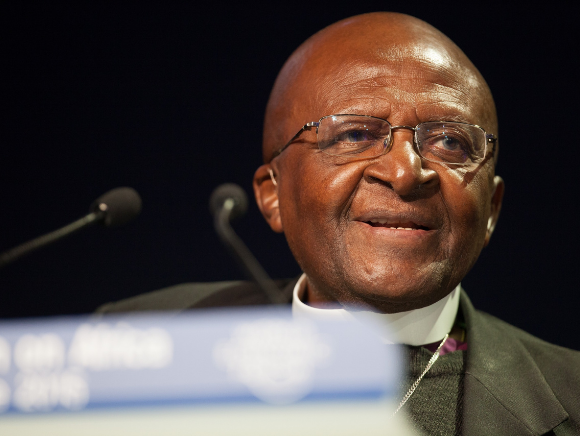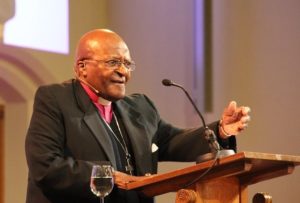He was a Nobel Peace Prize winner, an Anglican Archbishop of Cape Town, South Africa, and an ardent campaigner against South Africa’s Apartheid system. Desmond Tutu died in the early hours of Sunday, December 26. He was 90 years old and had been in ill health since 2013. He leaves behind him a legacy as a world statesman that few others can match.
South African President Cyril Ramaphosa extended his condolences to those close to Tutu, calling him “a patriot without equal.” He continued:
“A man of extraordinary intellect, integrity and invincibility against the forces of apartheid, he was also tender and vulnerable in his compassion for those who had suffered oppression, injustice and violence under apartheid, and oppressed and downtrodden people around the world.”
 A Notable Beginning
A Notable Beginning
Born in 1931 in the region formerly known as the Transvaal, Tutu was on the path to becoming a schoolteacher like his father when the government passed the Bantu Education Act to further segregation. Not willing to work in a two-tier education system, Tutu chose to become an Anglican priest. Upon graduation, with assistance from the International Missionary Council’s Theological Education Fund (TEF), Tutu sought and was accepted to a number of roles that furthered both his education and career. He taught and studied in England and Jerusalem, fast becoming a prominent figure in theological circles.
In 1972, TEF appointed Tutu as its Africa director, a high-profile position that required him to return to the U.K., where he became the honorary Curate of St Augustine’s Church. It was during this time that his thoughts turned to Liberation Theology. Just a few years later, he was back in South Africa as the first black man to hold the position of the Dean of St Mary’s Cathedral, Johannesburg. He used his platform to publicly endorse economic sanctions on the apartheid regime and shared platforms with prominent campaigners including Winne Mandela.
Politics
In 1978, Tutu became the head of the South African Council of Churches (SACC), notable because the organization was majority black represented. He said of the group:
“We in the SACC believe in a non-racial South Africa where people count because they are made in the image of God. So, the SACC is neither a black nor a white organization. It is a Christian organization with a definite bias in favor of the oppressed and the exploited ones of our society.”
As his profile grew, many described Tutu’s role as more activist than spiritual leader. He addressed the United Nations in New York, spoke internationally on the political situation in South Africa, and was nominated for the Nobel Peace Prize several times before finally winning the award in 1984.
Despite condemning violence in the name of ending apartheid, Tutu angered many supporters by defending those who had committed violence. A number of prominent white liberals who were also campaigning for an end to the oppressive two-tiered system cut ties with the Anglican over his anti-government rhetoric. Nelson Mandela referred to him at the time as “public enemy number one for the powers that be.”
End of Apartheid
In 1990, F.W. de Klerk lifted the ban on certain political parties like the African National Congress (ANC) – whose goals were supported by Tutu – and announced the upcoming release of Nelson Mandela. Many sources claim Tutu was instrumental in helping de Klerk navigate the political minefield.
Mandela and Tutu would cooperate closely over the following years. The Nelson Mandela foundation described the life of the former archbishop as a “blessing,” and noted that “His contributions to struggles against injustice, locally and globally, are matched only by the depth of his thinking about the making of liberatory futures for human societies.”
A Political Priest
Desmond Tutu leaves behind more than just a legacy of positions and appointments, but one of theology and politics blended.
The present archbishop of Cape Town, Thabo Makgoba, announced the church will be planning Tutu’s memorial services. Makgoba said, “Desmond Tutu’s legacy is moral strength, moral courage and clarity… He felt with the people. In public and alone, he cried because he felt people’s pain. And he laughed – no, not just laughed, he cackled with delight when he shared their joy.”
After a life at the forefront of one of the most significant political upheavals of the 20th century, Desmond Tutu was ultimately a man of God. As he himself put it:
“In the end what matters is not how good we are but how good God is. Not how much we love Him but how much He loves us. And God loves us whoever we are, whatever we’ve done or failed to do, whatever we believe or can’t.”
~ Read more from Mark Angelides.





